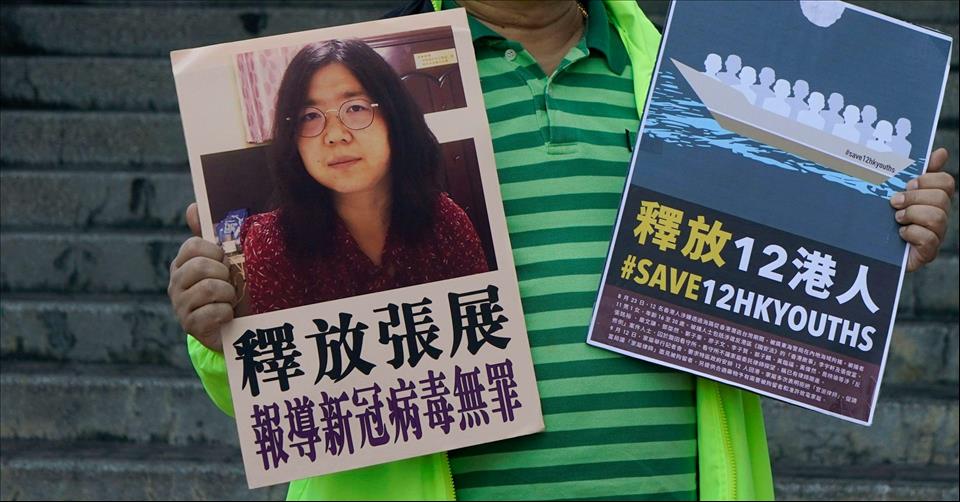
Chinese Journalist Who Raised Alarm Over COVID Is In Hiding: Is The World Noticing?
The charity Reporters Without Borders (RSF), which had campaigned for her release, said it continued to be concerned by her situation, as she remains under strict surveillance by the authorities.
RSF added that“partial freedom is not freedom at all”. It called for diplomatic intervention“to ensure her full and unconditional release without delay”.
On May 21 2024, Zhang released a video through an intermediary confirming her release in which she said she was staying with her brother in Shanghai. In the video, the former lawyer appeared in her dressing gown looking subdued, possibly ill, and speaking very softly.
She thanked those who had helped and supported her. As the video was filmed in a darkened corridor it is impossible to know if the location is in fact her brother's apartment.
In February 2020, Zhang had travelled to Wuhan where she filmed stories about the scale of the Wuhan lockdown, focusing on empty train stations, hospitals overflowing with patients and the strict limits on freedom of speech concerning the lockdown.
She posted these on social media and in one obtained by the BBC, you can see the police stopping her physically from filming. In the video she said:“Maybe I have a rebellious soul. I thought: Why can't I film these things? I think this is true reality. So why can't I film the truth?”
Zhang was arrested in May 2020 and was later charged with“picking quarrels and provoking trouble”, a vaguely worded charge which the Guardian's senior China correspondent Amy Hawkins says is standard for activists and elicits a 99% conviction rate. A further three Chinese citizen journalists were understood to have been detained around the same time as Zhang.
For reporting during lockdown, the BBC's John Sudworth was expelled in 2021, along with his wife Yvonne Murray who was the Beijing correspondent for the Irish public broadcaster RTÉ. During this period China also expelled correspondents working for the New York Times, the Washington Post, the Wall Street Journal, the Australian Broadcasting Corporation and the Australian Financial Review.
During her detention Zhang went on hunger strike and ended up being hospitalised. In one of her hearings, she was brought into court in a wheelchair. According to RSF , she had been force-fed through a nasal tube and was suffering from“severe malnutrition, gastrointestinal disease and low white blood cell count”.
In the recently released 2024 RSF World Press Freedom Index , China is ranked 172 out of 180 countries. The index notes that China is“the world's largest jailer of journalists” and that 106 journalists and three media workers are currently detained.
Chinese-Australia journalist Cheng Lei was imprisoned after breaking a news embargo. Australian AP/Alamy
We may never hear from Zhang about the conditions of her detention, but what is known from dual citizen journalists whom Beijing has detained in the past is that the conditions are always harsh. Chinese-Australian business presenter Cheng Lei spent three years in jail in China“for breaking an embargo by a few minutes” in 2020.
After major diplomatic campaigning, she was released, and was able to speak on her return to Melbourne, where she said her imprisonment was“like being buried alive”. During her detention, her only contact with the outdoors was to have a window opened for fifteen minutes a day.
Australian prime minister Anthony Albanese insisted that Cheng's release was not part of a deal struck with Beijing but that it happened following,“the completion of judicial processes in China”. This careful wording could be because Chinese-Australian writer and businessman Yang Hengjun, who is accused of spying, remains in detention and is said to be suffering from kidney and other health problems.
Yang has been in jail since 2019, and in February this year a court sentenced him to a suspended death sentence. The International Federation of Journalists said at the time that“Yang Hengjun's sentencing is egregious, and representative of the worst human rights abuses committed by Chinese authorities towards journalists and media workers”.
Global press freedom under threatBut it's not just China which is waging war with journalists. In a general comment about the state of the media, RSF said:“Press freedom around the world is being threatened by the very people who should be its guarantors – political authorities.” The bottom five countries in the RSF index demonstrate that it is repressive political regimes that are the worst abusers of human rights workers and journalists: Iran, North Korea, Afghanistan, Syria and Eritrea.
In Iran, local BBC journalists and their families have been harassed and attacked for many years or have been forced into exile. In April 2024, the BBC World Service“filed an urgent appeal to the UN over abuse of national security and counter-terrorism laws against BBC News Persian journalists”.
Meanwhile, the BBC's Iranian journalists continue to report on government's abuses. On May 2 this year, Iran's judiciary filed charges against“a number of [local] journalists and activists” who had posted comments online following a BBC Eye investigation into the death of teen protester and video activist Nika Shakarami.
The activist disappeared in 2022 after reportedly being detained by members of a paramilitary group, and her body was recovered a week later in a mortuary. The judiciary-run Mizan news agency labelled the BBC report,“fake, incorrect and full of mistakes”. It added that the activists who commented on the report were summoned for allegedly“disrupting the psychological security of society”.

Legal Disclaimer:
MENAFN provides the
information “as is” without warranty of any kind. We do not accept
any responsibility or liability for the accuracy, content, images,
videos, licenses, completeness, legality, or reliability of the information
contained in this article. If you have any complaints or copyright
issues related to this article, kindly contact the provider above.

















Comments
No comment